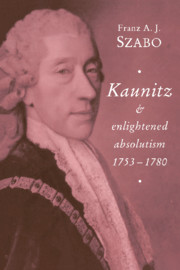2 - Chancellor of State
Published online by Cambridge University Press: 28 August 2009
Summary
The office which Kaunitz assumed in May 1753 was a relatively new one. The creation of a specific ministry, charged with the conduct of “foreign affairs and confidential dynastic matters,” had occurred only in February 1742. Of course, ministries in the modern sense did not exist in eighteenth-century Austria. The monarch remained the final instance of executive as well as legislative authority. Ministers were simply heads of specific departments of the central government's administrative machinery. The German title, Court Chancellor (Hofkanzler), is therefore a much more accurate description of a minister's functions. In the Habsburg Monarchy of the eighteenth century there were numerous such Court Chancellors responsible for a variety of executive departments, all with different regional jurisdictions: Austria, Bohemia, Hungary, Transylvania or the Holy Roman Empire. The creation of a Court Chancellery (Hofkanzlei) in 1742 whose agenda brought together the private affairs of the dynasty, or “Haus” – in this case the House of Habsburg – with the conduct of all diplomatic relations (which in eighteenth-century German were called “Staatssachen”), thus eventually saddled the ministry with the colourful name of “House, Court and State Chancellery” (Haus-, Hof- und Staatskanzlei). Almost from the beginning this unwieldy title was abbreviated to Chancellery of State (Staatskanzlei), and the minister himself was generally referred to as Chancellor of State (Staatskanzler).
More explicitly ministerial forms of government emerged in the eighteenth century as part of the general trend towards professionalism and bureaucratization from the previously more conciliar forms of decision-making.
- Type
- Chapter
- Information
- Kaunitz and Enlightened Absolutism 1753–1780 , pp. 36 - 72Publisher: Cambridge University PressPrint publication year: 1994



